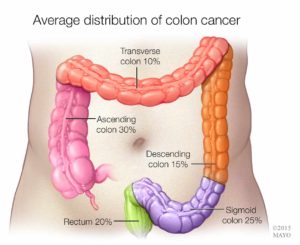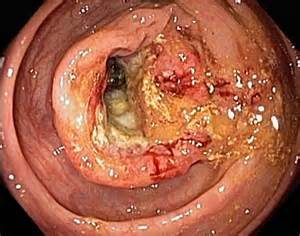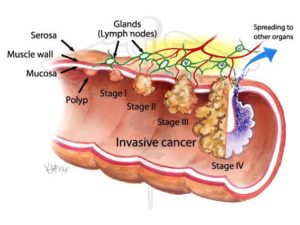The colon is part of the body’s digestive system. The digestive system removes and processes nutrients (vitamins, minerals, carbohydrates, fats, proteins, and water) from foods and helps pass waste material out of the body. The digestive system is made up of the esophagus, stomach, and the small and large intestines. The colon (large bowel) is the first part of the large intestine and is about 5 feet long. Together, the rectum and anal canal make up the last part of the large intestine and are about 6-8 inches long. The anal canal ends at the anus (the opening of the large intestine to the outside of the body).
Colorectal cancer starts in the colon or the rectum. These cancers can also be called colon cancer or rectal cancer, depending on where they start. Colon cancer and rectal cancer are often grouped together because they have many features in common. So this is why pt’s are diagnosed at times colorectal cancer by some M.D.’s.
Key Points
- Colon cancer is a disease in which malignant (cancer) cells form in the tissues of the colon.
- Health history can affect the risk of developing colon cancer.
- Signs of colon cancer include blood in the stool or a change in bowel habits.
- Tests that examine the colon and rectum are used to detect (find) and diagnose colon cancer.
- Certain factors affect prognosis (chance of recovery) and treatment options.
Colon cancer typical symptoms to know as a red light that could indicate colon cancer:
A.) Troubles in the bathroom-People diagnosed with colon cancer often look back and realize they’d been struggling with mysterious digestive problems for some time. These issues are embarrassing to talk about, but it’s important not to keep this early sign of colorectal cancer to yourself. Like chronic diarrhea, gas, or constipation, or a combination of all three. (Of particular concern are alternating bouts of diarrhea and constipation.) You may also notice that it feels like your bowels aren’t emptying completely or notice “pencil stools” that are thinner than usual. Many colorectal cancer patients say they received a prior diagnosis of colitis, irritable bowel syndrome, or another bowel condition before they were tested and diagnosed with cancer.
B.) One of the few signs of colorectal cancer that appears early in the progression of the disease is fatigue, weakness, and general malaise
C.) Weight loss that can’t be explained by other factors is probably the most common early sign of colon and other digestive cancers.
D.) One bout of upset stomach is nothing to worry about. Ongoing or repeated bouts of cramping, indigestion, nausea, and vomiting, however, are cause for concern.
REVISED 3/5/2022


